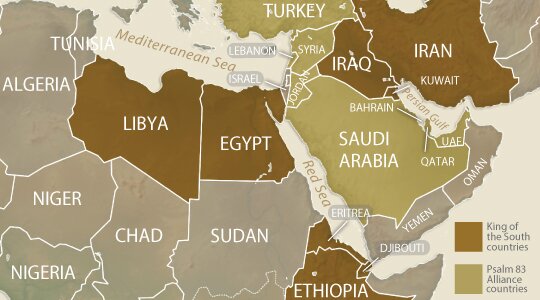
Netanyahu’s Dangerous Arab Outreach
JERUSALEM—Believe it or not, Israel and the Arab world are now closer than ever before.
Last week, retired army general from Saudi Arabia, Anwar Eshki, led a delegation of academics and businessmen to Israel for meetings. A week earlier, Egyptian Foreign Minister Sameh Hassan Shoukry visited the prime minister’s residence in Jerusalem after nine years of absence. Shortly thereafter, a picture surfaced on social media of Prime Minister Benjamin Netanyahu and Mr. Shoukry sharing a moment as they watched the Euro 2016 soccer final together. A couple of weeks before that, Turkey and Israel announced they had reached a compromise and were once again ready to restore full diplomatic relations.
All of this in just the past month.
“Twenty, thirty years ago, everyone said ‘Solve the Palestinian issue and you’ll have peace with the Arab world,’” stated Dore Gold, director general of Israel’s Foreign Ministry and Netanyahu’s point man driving the outreach to moderate Arab states. “Increasingly we are becoming convinced it’s the exact opposite,” Gold continued. “It’s a different order we have to create. And that’s what we’re going to do.”
The fact that Israel is reaching out to the Arab states to create a new order in the Middle East isn’t too extraordinary; Israel has always been willing to search out friendship wherever it can get it. What’s surprising is that the Arab states are willing to jeopardize their own popularity at home in order to accept Israel’s overtures.
What is the meaning of Israel’s warming ties with the Arab world? Are we witnessing the transformation of Israel’s relationship with its neighbors? More importantly, will bridging the gap between Israel and its historic enemies end well?
Meeting Middle Eastern Realities
The first glimpse of Israel’s warming ties with Arab states came about a year ago when Gold and Eshki shared the stage in Washington, D.C., to address the Council on Foreign Relations think tank. At the time, they revealed that five secret bilateral meetings between the countries had taken place in the previous 17 months in locations throughout Europe and Asia. The meetings were initiated to discuss two challenges they both face: Iran’s quest for Middle East domination and what to do about America’s withdrawal from the region.
As Mr. Gold later stated, “Clearly there’s been a convergence of interests between Israel and many Sunni-Arab states given the fact that they both face identical challenges in the region.”
These dual challenges have led to the temporary alliance between Israel and the Saudis as well as the other Sunni-Arab states in the Middle East. As the United States can no longer be relied upon to counter Iran’s rise, or even its march to acquiring a nuclear weapon, the Arab states and Israel are working on their own collective defense of sorts. Israel, the only nuclear power in the Middle East, is capable of a military strike against Iran’s nuclear infrastructure. Saudi Arabia, Turkey and Egypt could all perform a similar strike, but would likely not want to deal with the fallout that would create.
Also, Israel, Turkey and Saudi Arabia would all like to see Iran’s proxies in Syria and Lebanon fall out of power, and they have no doubt discussed ways to bring this about.
In these two areas, there is a clear aligning of interests between Israel and the Arabs. However, you can be sure that the Arabs would not be openly talking with the Israelis if they could find any other way to counter Iran. The fact that they are meeting together shows how endangered and helpless the Arabs feel.
And herein lies the danger in these warming relations with the Arab states: The alliance is motivated purely out of fear, not a change in the collective Arab heart toward Israel.
The danger in alliances based on a temporary convergence of interests, rather than being based on shared values, is that they are exactly that—temporary.
Prophesied Outcome?
Of course, the smart people in charge of Israel’s foreign policy recognize this reality as well and undoubtedly would argue that they will cooperate while they can—especially considering the greater danger facing them with Iran’s rise.
And while Iran does pose the greatest threat to Israel, Bible prophecy says that it is not Iran that will strike down Israel—rather it will be most of the nations it is currently aligning with. An alliance of nations is mentioned in Psalm 83:5-8 that includes Saudi Arabia and the other Gulf states, as well as Turkey, Jordan and Germany. The proceeding verses tell us what really motivates this alliance:

They have taken crafty counsel against your people, and consulted against your hidden ones. For they have said, Come, and let us cut them off from being a nation; that the name of Israel may be no more in remembrance. For they have consulted together with one [heart]: they are confederate against you!
This mysterious alliance desires Israel’s downfall and will work to that end—it is in their unchanged collective heart to do so. But notice also part of their strategy is to take “crafty counsel” against Israel (which includes more than just the little nation of Israel in the Middle East). Putting this together with other prophecies found in the book of Hosea, and we can see that this alliance performs a great act of treachery against Israel. And treachery can only be perpetrated against an assumed ally. Please read “A Mysterious Alliance” by Trumpet editor Gerald Flurry to understand more details about this treacherous alliance now forming against Israel, as well as its surprising hope-filled end.
